#spoonie studyblr
Text
25 August 2023
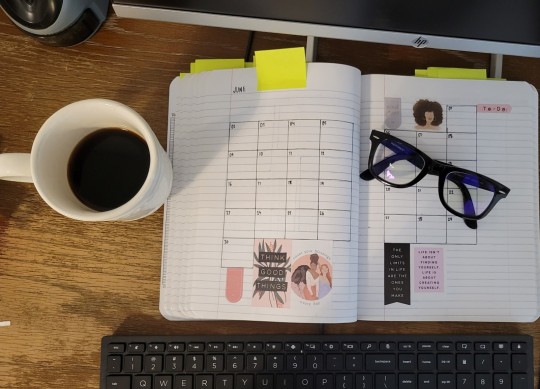
📚 Currently reading: What Doesn’t Kill Us Makes Us: Who We Become After Tragedy and Trauma by Mike Mariani
🎵 Currently listening: Belle and Sebastian, "When We Were Very Young"
I just found out that my family is going to the beach next weekend for my birthday. I'm so excited to go! There are a lot of fun things to do down at the beach where we stay. There's a library very close to the beach house where we're staying; I want to see if I can sign up for a card.
To-Do
Duolingo: Spanish -> Unit 230 -> Part 4
Duolingo: Hebrew -> Unit 7 -> Part 6
Physical therapy
Finish June planner layout
Read chapter 5 of What Doesn't Kill Us Makes Us
#studyblr#humanities#university studyblr#spoonie studyblr#langblr#university#studyspo#ohthehumanities#university student#college#spanish langblr#hebrew langblr#gradblr#study blog#study motivation#studyinspo#studying#studyblr community#academia aesthetic
22 notes
·
View notes
Text

1.03.2023
Fun fact: I’m a part-time student so I get to take exams in March, which I desperately need to because I struggled very badly to study over the winter holidays and didn’t do any exams in January or February.
I’m being treated for some health issues as well, so hopefully a combination of better health and caffeinated drinks (in moderation) will help me finally do these exams. I’m already struggling less to study and go to my classes, way less than I did last semester :-)
5 notes
·
View notes
Text
tips for stem majors in math and science courses (spoonie + neurodivergent friendly)
hi y’all! my nameis lila and i’m a 28 year old physics and anthropology major who’s about 2 years through college (in the US)! as we’re coming up on the start of the fall ‘23 college semester, i thought i might share some really solid hacks for fellow STEM students taking science and/or math courses that i’ve basically built my college academic career on. and! these study tips are spoonie and adhd friendly! as a matter of fact, a lot of these are tips/methods that specifically work for me as a neurodivergent spoonie (i have pretty severe adhd, as well as POTS and ME/CFS), but that i think non-disabled/non-spoonie and/or neurotypical students could also benefit from using! so with out any further ado, here are my 7 tried and true study hacks for college math and science classes…
1) discover your learning style and tailor your studying towards leveraging it.
you’ve probably heard of visual, audio, and kinesthetic learning styles, but did you now there’s actually way more learning styles than just those three? i’m personally a “social learner,” meaning i learn best through discussion and socialization with 1+ other people to interact with. this could look like teaching other classmates concepts and methods that we’ve learned or discussing ideas with classmates and/or professors until i fully understand the concepts at play and how they connect and can reflect them in performing analysis and application, etc. honestly, figuring out my learning style was hands down one of the most helpful things i’ve done in college. it has allowed me to choose professors who i will mesh better with in terms of how they teach, as well as to adapt materials and methods to my style of learning in order to master them quicker and more effectively.
2) rewrite your notes after lecture, for the love of god.
this tip actually comes from my high school IB Math HL teacher, who told me to do this when i originally left high school for college. even if you think you’ve mastered the basics of the topic covered during the lecture, rewriting those notes after lecture helps really hammer in the knowledge that you’ve already established and also helps to get the wheels turning on pieces of information you might have less of a grasp on. try tp set aside at least 30 - 40 minutes after class to just rewrite your notes and try to really digest the information.
3) body doubling is one of the most beneficial things ever to be invented even if you’re not adhd, and i WILL die on that hill, thank you very much.
“body doubling” or “having an accountabilibuddy” are interchangeable terms in the adhd community that mean you have one or more consistent study buddy/buddies who you do all the homework and/or studying with in person on a regular basis, even if you’re just working next to each other in total silence. this does a couple of things. first off, it forces homework/assignments/studying to become a concrete social obligation you need to regularly show up for, rather than a nebulous obligation based on an invisible deadline. second off, it gives you 1+ partners to work out your problems concerning course topics with. third off, it allows you to build a network of peers where you feel comfortable helping each other with course material (this is especially great because it’s likely you and your classmates have different strengths regarding course content). tbh, body doubling is the other method that i, personally, have found most useful in college and i highly recommend trying it, even if you don’t have adhd.
4) teach others/your classmates the analysis and application methods you’ve learned, even if those methods aren’t 100% solidified for you (trust me on this).
the goal of stem courses is never memorization, but rather being able to understand a topic well enough to analyze a similar situation and apply the what you’ve learned creatively. this is where teaching others comes in. in order to teach others a concept and its related analysis and application well, you have to have at least a fraction of a decent understanding of these things yourself, and, further, often time in teaching these things you also learn to grasp the concepts/aanalysis/applications even better than you did before with each new teaching session. basically: teaching others is a creative way of also teaching yourself. you get the benefits of repetition, of thinking about a concept/technique/analysis and application in a new way, and of getting to apply the concept/technique/analysis and applicatioin to a new scenario each time. plus, you’ll typically make friends quickly in the process! there’s really no downside to this tip imo ;-)
5) utilize your college’s tutoring center/program(s), even when you don’t think you need to.
usually colleges have either set up a general “tutoring center,” on campus where you can find tutors for all different kinds of topics and courses available during regular hours for walk-in sessions and/or appointments free of charge or departments will hold regular weekly (or twice weekly) free on-campus tutoring sessions for specific courses. regardless of which of these options your college has, i highly recommend attending at least one tutoring session/appointment (ideally with the same tutor if/when you eventually find one you click with) every single week, even when you don’t feel like you’re struggling with the topic(s) covered in that week’s lecture. this will help you review topics and techniques covered in lecture, deepen your understanding of them, and, if nothing else, it’s an excuse to get homework out of the way while having someone else there who can help you if/when you get stuck. attending at least one session weekly also helps you get into a habit and routine of keeping up with your assignments, so you’re not left scrambling at the last minute before they’re due.
6) if you have accommodations, request access to record lectures. if you do not have accommodations, ask your professor if you are allowed to record lectures. IF YOU RECORD LECTURES, DO NOT FORGET TO REVIEW THEM!
okay, so first up for my fellow spoonies and neurodivergent peeps: when you apply for/renew your accommodations, make sure that “recordinng lectures” is on your MOA (memorandum of accommodations), because so long as it is, your professors legally cannot deny you permission to record lectures without risk of themself and the college being sued for an ADA violation. also, make friends with a classmate and ask them to record lectures and send them to you if/when you are absent (let the professor know that you’ve asked this classmate to record and send you the lecture if you are absent)
now, if you aren’t disabled, a spoonie, and/or neurodivergent, you aren’t guaranteed permission to record lectures. however. ask the professor if you can have their permission to audio record lectures (be sure to also let them know that such a recording would be for personal use only and that you don’t plan on distributing the recordings). i’ve found that many professors don’t mind you having an audio recording.
even if you aren’t an audible learner it can be really useful to have these recordings to review at a later point. oftentimes reviewing lecture recordings can be useful if you glazed over and missed a section of the lecture and/or if you can’t remember what a professor taught during a section of a lecture.
7) last but not least, on a related note, if you have accommodations, also request access to your professor’s lecture notes. if you don’t have accommodations, check if your professor posts their lecture notes for students to use.
having your professor’s notes can be extremely useful for review purposes, but they can also help you understand where your professor is going with course content and what they want to stress as important.
#studyblr#study tips#study hacks#adhd studyblr#adhd study tips#adhd#spoonie#college studyblr#college study tips#college study hacks#disability#chronic illness#collegeblr#college#uni#uniblr#university#tips and tricks#text#mine
189 notes
·
View notes
Text
Although I'm mostly a studyblr, recently my disability has been affecting my uni life more and more, and I think I've been avoiding posting about it for fear of putting off my followers. But the truth is I want to be able to post on here about how my disability affects my life and my studies, I want to be able to share my unique experiences.
So this is just a little post for my followers to let you know that I will be posting about my disability from now on, as well as studyblr content. And idk how many more disabled users are on this side of tumblr, but please interact if you're here!
#studyblr#physics#stem#stemblr#study aesthetic#study blog#studying#women in stem#spoonie#spoon theory#disabled#arthritis#rheumatoid arthritis#rheumatology#disabled student
81 notes
·
View notes
Text
Spoon Theory for Studying
*for my neurodivergent & chronically ill college students*
Set daily expectations based on how many spoons you have:
0-1 Spoon
Studying:
Educational videos or documentaries in bed
Podcast with your eyes closed
Read 5 pages in bed
Listen to an audiobook
TED Talks & YouTube videos
Daily Life/Self Care:
Brush teeth
Take a nap
Stretch/yoga in bed
Open the blinds or go outside for some sun
Have some tea
2-3 Spoons
Studying:
Read 5-20 pages
Work on assignments for 40 minutes, 20 minute break, & repeat for as long as you can keep going (even if it’s just once)
Write notes for the length of 1 podcast episode (use the podcast as your timer)
Organize documents on your computer
Create quizlet’s or Kahoot’s to use
Discussion posts
Write or work on a small portion of a big assignment/project for an hour
Daily Life:
Shower or bath
Wash hair and/or face
Wash laundry & leave it in the dryer (or clean hamper)
Do the dishes
Lotion body
Clean up or put things away for the length of one playlist or podcast
Make something quick/easy to eat
4-5 Spoons
Studying:
Focus on the hardest tasks for high-spoon days.
Maybe keep a list of tasks/assignments you think should be designated for high-spoon days & do those.
Or keep a list of things you’ve done throughout the week, then complete everything leftover (for as long as you’re able to) on high-spoon days.
Daily Life:
Anything you’ve been needing to do
Grocery shopping
Folding & putting away the laundry
Intense cleaning
Full shower & self-care: wash hair, body, face, scrub feet, shave - lotion, face mask, skin care routine - dry hair, maybe style it - paint nails if that’s your thing
Any more ideas??
#adhd#adhd things#adult adhd#actually adhd#spoonie#spoon theory#potsie#pots#EDS#heds#ehlers danlos zebra#autism#actually autistic#being autistic#spoonie study tips#adhd studyblr#studyblr#study tips#college
704 notes
·
View notes
Text
There are times in college where you just have to cut yourself a break.
I have multiple learning disabilities and physical disabilities. Currently, I have four Cs on my transcript. Four. I hear my neurotypical acquaintances and friends talk about never having below a B- and saying how low their grades are. I know people lie about their grades so I take everything with a grain of salt, but it still hurts when you feel like you're behind your peers.
I'm happy to say I've embraced "Cs get degrees" and I've never failed a class and y'know what, that's sometimes all I can ask for. Even with all the accomodations in the world, I'd still have auditory processing issues, difficulties writing/reading, and mixing up math and chemical equations. The best thing for me would be to either get rid of all tests(impossible) or make every test open note/open book(impossible) so I just try my best.
Getting through academia while ND and physical disabled is difficult. And it's vital to know that sometimes you can only reach good enough.
I feel like on studyblr and in academia you're always comparing yourself with other people, and that's not fair. So a reminder to all my followers, cut yourself a break.
#studyblr#thelegendofstudy#biology#stemblr#biology major#college#studyspo#actually neurodivergent#dyslexia#dyslexic student#spoonie#disability#grades
113 notes
·
View notes
Text
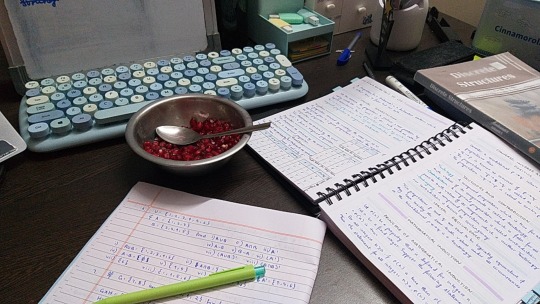
January 16, 2024 • Tuesday
• --- HARDCORE WEEK - DAY 2/15 --- •
I studied for 7.5 hours today. The hardcore is really hardcoring huh?
I slipped on water and fell yesterday, and my body is in a constant state of flaring up and settling down since then. Right now my feet burn and I can feel the pain climbing up my jaw. I am chugging painkillers like alcohol lol (they're ones that give no side effects dw)
🎧 HOV-Remix — Connor Price, Nic D, GRAHAM

#dailyfoxposts#studyspo#study#note taking#days of productivity#hardcore week#hardcore week challenge#study aesthetic#inspo#aesthetic studyblr#studyblr#mathematics#maths#math#mathblr#fibromyalgia#spoonie life#disabled#disability
16 notes
·
View notes
Text

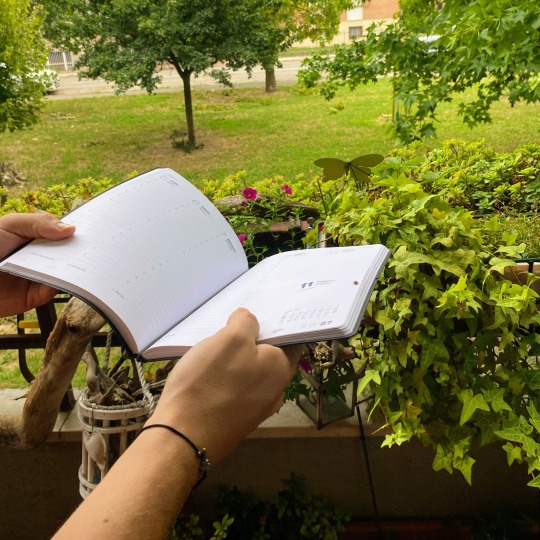
virtual journal, 24/07
today me and my boyfriend had a goodbye ceremony to release his last tiny jumping spider, pictured above (bye marigold!) 🪐🌱
reminder: your perfectionist—judging—side will always tell you what you need to be, what you should be, and yet authenticity is found in the could
i rested after some chaotic days (im a low energy individual !🌷), read for an hour, journaled, sang
#alicewritten#spilled journal#journaling#studyblr#noteblr#notebook#commonplace book#naturecore#soft academia#light academia#low spoons#spoonie#bookblr#currently reading#100dop#100 days of productivity#healing#notes to self#gentle reminder#softcore#cottagecore#spilled ink
45 notes
·
View notes
Text
How do I explain to my professors, bosses, misc. authority figures that I am constantly late because I need to take care of myself
Like yeah I woke up and I can get to get to work on time if I leave right when I’m dressed but I need to eat because this is the only time of the day I can physically bring myself to
#studyblr#workblr#executive dysfunction#ADHD#autism#autism awareness#ASD#major depressive disorder#depression disorder#mental health awareness#chronic pain#accommodations#accessability#spoonie#mental health#self care#katzs studyblr#katzs workblr
98 notes
·
View notes
Text
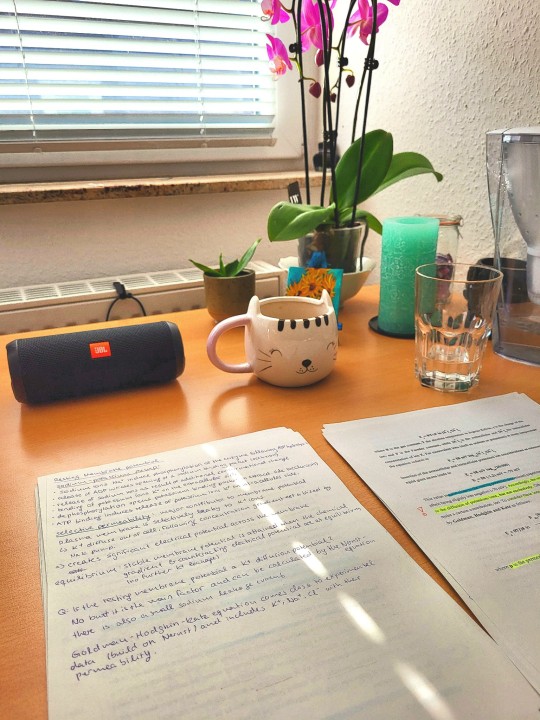
rare picture of my own study set-up.
In a flare and the fever is making it hard to focus, but I'm trying to get some Neurobiology done anyways. Plants and coffee are keeping me company.
Open for name suggestions for my new orchid friend :3
#tarastudiesalot#studying#women in stem#cognitive science#studyblr#university#study notes#study blog#spoonie student
14 notes
·
View notes
Text
Getting Accommodations For College: A Guide
Disclaimer: This post is centered on people with chronic illnesses, neurodivergences, and mental health issues since that’s what I have the most experience with and because we often do not know we are eligible for accommodations or don’t know what we’re allowed to ask for. I’m also U.S.-based, and I don’t really know how disability law works elsewhere. Also, you should know that professors, doctors, and disability services all frequently impede the accommodations process. Getting accommodations usually involves a lot of self-advocacy work on your part, so be ready for that.
Am I disabled enough for accommodations?
If you have been diagnosed with a chronic mental or physical health condition, and it impacts your ability to engage with classes, then yes!
This can look like: missing classes for doctor’s appointments or because you’re not feeling well, getting marked down because you’re too socially anxious to raise your hand in class, or being unable to finish tests on time due to ADHD/anxiety/etc. There might also be things that you are able to do, but that are much more difficult for you than for an abled student. You can get accommodations for those things too, and you aren’t just being “lazy”.
Yes, anxiety and depression count. Yes, chronic pain counts. Yes, endometriosis counts. Yes, even if you have pretty good grades, or if your disability only affects you some of the time. If you’re diagnosed with it and it’s affecting your performance in school, it counts!
But I’m not diagnosed!
Are you getting treatment (e.g. therapy or medication)? Are you using insurance to pay for it? Then you’re diagnosed! It’s very likely your doctor/therapist didn’t tell you what your diagnosis was because they didn’t think it was relevant. At your next appointment, tell them your symptoms have been causing issues with school (be specific!!) and ask if they’d be willing to work with you to get accommodations.
Are you diagnosed with some things, but not others? For instance, do you have diagnosed anxiety, but suspect you have ADHD as well? You can just report the diagnosis you have. Even if you have multiple formal diagnoses, it’s a good idea to report only the diagnoses you absolutely need to report to justify getting accommodations, because you will need to provide documentation for everything you report.
Are you diagnosed with something vague (like “joint hypermobility” or “dysmenorrhea”)? Were you told “It’s probably xyz but we don’t know for sure”? You don’t need a more specific version of the diagnosis to access accommodations. Talk to your doctor about how this is affecting your academics, and ask them if they’d be willing to write a note for accommodations. Many doctors are especially willing to do this if the accommodations you mention are things that would not help an abled student (e.g. if you just want to have your medications with you in class).
If you’re really not formally diagnosed with anything, you will need to do that. Keep in mind some things are easier to get diagnoses for than others (e.g. it is much easier to get a diagnosis for depression than for autism). And again, you are eligible for accommodations if you have any diagnosis at all, even if it’s vague or if you think you’re misdiagnosed. Often just going to a therapist or the campus clinic will be adequate (although it’s 100% valid to want to pursue a more accurate diagnosis for other reasons). At minimum, you can ask them to refer you to someone else who can help!
What accommodations are available?
It will vary by university, but here are some my school offers!
Attendance/participation accommodations
Camera off in Zoom lectures
Help getting from class to class (e.g. a shuttle)
Elevator access
Ability to be slightly early or late without penalty
Ability to miss a certain number of classes
Ability to briefly leave class
Alternatives to spontaneous class participation (e.g. no cold calling)
Alternatives for group work
Remote course participation (during Covid)
Testing accommodations
Extra time on tests
No early morning tests (for instance, if your meds take a while to kick in)
Access to a basic calculator for all tests
Spelling/grammar checker for tests
Low-distraction environment for tests
Memory aid for tests (e.g. a vocab sheet)
Lab accommodations
Anti-fatigue mats
Access to a stool
Access to medications, food, or drink
Access to a calculator
Lecture accommodations:
Calculator or computer for in-class assignments
Extra time on in-class assignments
Recorded lectures
Note-taking help
Ability to type notes
Copies of lecture materials (e.g. PowerPoints)
Assignments
Extra time on homework
Alternatives to oral presentations
Any instructions that are given verbally are also written down
Keep in mind you will need to explain how the disability you experience justifies the accommodations you are requesting.
Remember: Reasonable accommodations are your right as a disabled student. Use them!
17 notes
·
View notes
Text
25 September 2023
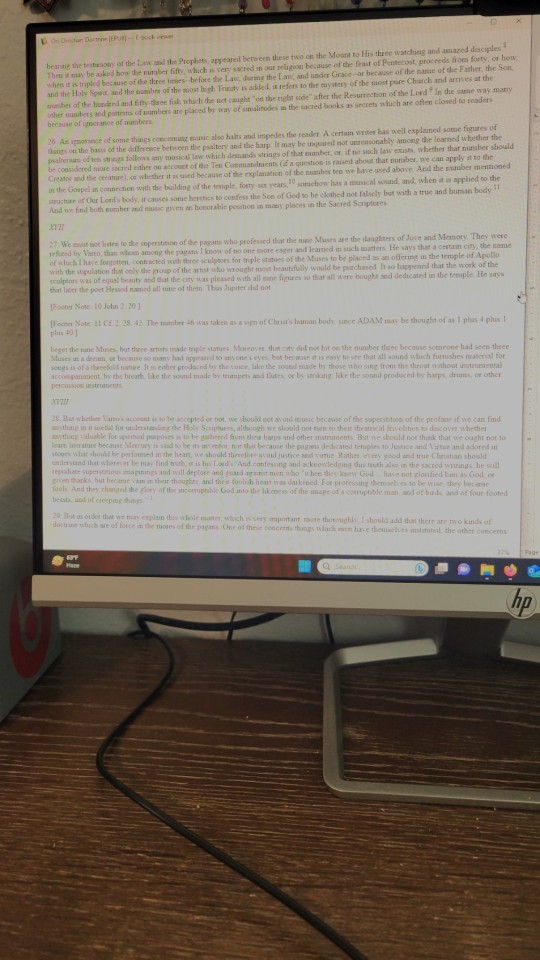
Another day of learning, another day of adventures!
I started teaching religious education yesterday: At least, I would have, if any of my kids had shown up to class! I have to send an email out to the parents introducing myself. As of right now, there are only three kids in my class.
I need to prepare today for two job interviews that I have tomorrow. Both are with eating disorder treatment places near my house. I doubt I'll get a job offer due to how recently I've been in treatment, but I'm feeling a really strong pull to continue exploring a career in mental health treatment.
To-Do
Finish book two of De Doctrina Christiana
Read Apologetics and Catholic Doctrine, chapter 10
Read Apologetics and Catholic Doctrine, chapter 11
Watch Fundamental Theology lecture 6.1
Watch Fundamental Theology lecture 6.2
Review Resume
Practice interview questions
15-Day Language Challenge
Day 4: The most challenging thing about your target language
Each language has a language-specific challenge (something I find hard specific to the language) and a personal challenge (something I find hard about the language due to my learning disability).
I find Spanish a relative easy language to study. Because I've heard it my entire life, a lot of the properties come intuitively. As I advance in my studies, I notice that I have trouble with the more complicated verb tenses, as well as the conjugation of haber. Those are the language-specific challenges. My personal challenge is that I have aphasia (an inability to recall words), which hinders my ability to name objects in my original and target languages. When I can't put words to the images in my mind in Spanish or English, it presents some obvious difficulties, which are more pronounced when I speak Spanish.
My main language-specific challenge with Hebrew is the lack of Greek or Latin cognates. When I can use cognates, it makes learning vocabulary a bit quicker because I can draw comparisons more easily between languages. Without them, I'm learning entirely new terminology for languages.
~ Esther
#ohthehumanities#studyblr#humanities#university studyblr#spoonie studyblr#langblr#studyspo#university#university student#college#theology studyblr#theologyblr#theology student#catholic theology#theology#graduate school#gradlife#grad student#grad school#gradblr#15-day language challenge#study hard#study space#study aesthetic#study blog#study motivation#studyblr community#studywithme#studying#student
13 notes
·
View notes
Text
to the chronically ill or disabled student: you're not a failure if you can't accomplish schoolwork or if it's hard for you to keep up. your grades & ability to complete assignments are not measures of your worth or intelligence. you are worthy and valid just as you are. 📝💛
13 notes
·
View notes
Text
2nd March 2023
11/100 days of productivity
Today I haven't been productive at all. Today the only thing I did was realize that I am really unwell
Not taking the Vyvanse took away the drug induced energy so I could feel all the fatigue and pain I've been functioning under
So I took the day off. Should I suspend the 100 days count or just count self care as productivity?
I'm counting. Yeah. I wanna inspire other ambitious spoonies to just take the time off if they need it
4 notes
·
View notes
Note
Hi! Would you mind talking about what your disability is? Only if you're comfortable tho <3
This is totally fine, thank you for the ask! Longish post so I'm going to add a read more after the important stuff.
The reason I didn't share in the original post was that there is still a lot of investigation going on and some things that aren't quite clear yet, but I'll share what I do know.
Recently, after years and years of doctors and hospital visits, I was diagnosed with ankylosing spondylitis (AS). This is a type of inflammatory arthritis (similar to rheumatoid arthritis, but affects slightly different joints). The main places I am affected is my lower back and SI joints, hips, knees and shoulders. AS causes pain and stiffness in the affected joints, and also causes extreme fatigue.
It differs person to person, but for me my AS can make it difficult even just to get to campus, what with waking up still feeling exhausted and the pain in my lower back/hips making it hard to walk. This happens mostly during flare ups, but even during my 'average' pain days it can be pretty tough getting myself into class.
Pain and stiffness in my hands is less common, but when it happens it can make writing much more difficult for me and so studying in general becomes much more of a chore than something I can enjoy.
Sleep and fatigue are just hell: My AS causes sleepiness, my pain makes it hard for me to get restful sleep, my medications cause sleepiness, and it finally makes sense why I am so damn exhausted all the time.
I'm currently talking with my universities disability team to get the required adjustments and support, which has been really great in my experience. I might be struggling but I'm doing everything I can do improve and make my life better, and honestly, I just wanna be able to live my life doing what I love.
#studyblr#disabled#disabled student#ankylosing spondylitis#arthritis#rheumatology#spoonie#spoon theory#chronic pain#chronic fatigue#study blog#studying#women in stem
12 notes
·
View notes
Text
Love language = acts of service
Biggest ick of my life = people touching my things or trying to help me in any way possible.
#adhd#spoonie#actually autistic#adhd things#adhd studyblr#actually adhd#potsie#adult adhd#love language#acts of service#bpd
173 notes
·
View notes